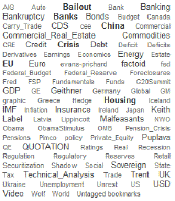SULTANS
OF SWAP: ACT II - The Sting!
 There
are 7 stages to executing a successful sting operation. Whether this is
the modus operandi behind the Sultans of Swap operating in the $605
Trillion OTC Derivatives market or just simple coincidence, I will leave
it to you shrewd reader to determine. The seven stages do however
offer us an instructive theater guide to better understand these murky
instruments called Interest Rate Swaps.
There
are 7 stages to executing a successful sting operation. Whether this is
the modus operandi behind the Sultans of Swap operating in the $605
Trillion OTC Derivatives market or just simple coincidence, I will leave
it to you shrewd reader to determine. The seven stages do however
offer us an instructive theater guide to better understand these murky
instruments called Interest Rate Swaps.
Act I can
be found at
SULTANS OF
SWAP: Smoking Guns!
In Act I of our fictional play, we
discovered the players, how our Sting had been set-up, the innovative
financing arrangements employed and the trading mechanism that allowed our
Sting to be potentially perpetrated.
There was a very interesting development however that occurred during our
play�s intermission. We had a fight break out between our DIRECTORS. Our
sleepy actors behind the stage curtains were heard arguing amongst themselves as our audience enjoyed a casual libation and pondered the
smoking guns unveiled in Act I.
What they overheard was the White House (a DIRECTOR) refusing to support
European legislative efforts to stop the apparent deviant behavior of our
sinister SPECULATORS. (See
Act I for your theater guide).
Angela
Merkel
and
Nicolas Sarkozy
emphatically demanded changes
in European Derivatives trading, and they sent Greek Prime Minister George
Papandreou to the White House as an example of a vulnerable victim (PATSY)
to plead the case. He was
quickly rebuked,
being informed that this �was a Greek problem�. The audience once again
heard Johnny Depp�s famous quip from the mob movie �Donnie Brasco�,
when Brasco was trapped in similar exposing entanglements responding �Forget
about it!�. Without US legislation, any European actions
attempted would be knowingly useless in today�s global trading markets.
The President was fully cognizant of this, especially when he authorized
the
$170B of bailouts by the US government
on AIG�s CDSs (Credit Default Swaps) which had been headquartered and
executed out of London. Who has our President possibly been listening to,
especially since he was elected on a platform of �Change� in the midst of
the financial meltdown?
The
cartoon of the White House I saw recently on the web is an indication of a
strong growing public perception. These actions by the White House simply
reinforce this view. Sites are now
detailing
relationship grids with the White House.
I point this out not to cast dispersions on the parties
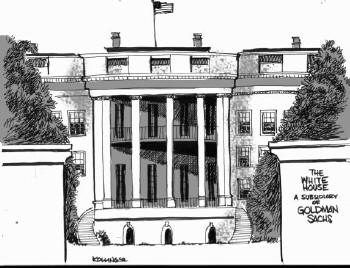 depicted
by this particular cartoonist, but rather to highlight the public outrage
that is becoming clearly prevalent.
depicted
by this particular cartoonist, but rather to highlight the public outrage
that is becoming clearly prevalent.
But this
is not the full argument between our DIRECTORS that the audience
overheard. The day after the President�s meeting, Gary Gensler the
Chairman of the CFTC (US Commodity Futures Trading Commission) and the
chief enforcement DIRECTOR in the US, spoke in an address to
Markit�s
Outlook for OTC Derivatives Markets Conference
and then again two days later at the
International Regulators to Discuss Future Industry Issues.
He
spelled out almost verbatim
that which we dear reader laid out in Act I concerning the OTC and CDS
trading. I absolutely applaud him and all the professional members within
the OTC. I strongly recommend you study carefully his remarks in full
(1)(2). Make no doubt about it appalled reader, the vast majority of
practicing professionals want this mess cleaned up. There appears to be a powerful element that has the ear of the Legislative Branch of the
US government. Without stringent legislation, the enforcement agencies are
toothless tigers. This is a remake of the play starring former CFTC
Commissioner Brooksley Born in her well documented efforts by
PBS
Frontline�s �The Waring�
which would have potentially avoided the whole 2008 financial crisis (3).
The Washington �Blame Game" cannot be placed at the feet of the CFTC,
though I am sure the commissioner will be another �Fall Guy� in future
years when the Sting has occurred and a successful Getaway has taken
place. Our 7 steps to a successful Sting mandate a �Fall Guy� which allows
for the deflection during the masked getaway. Commissioner Gensler
obviously does not knowingly want to be cast as yet another PATSY in our
instructional theater.
ACT II � THE STING
The
second act is the heist itself. With rare exception, the heist will be
successful, though some number of unexpected events will occur.
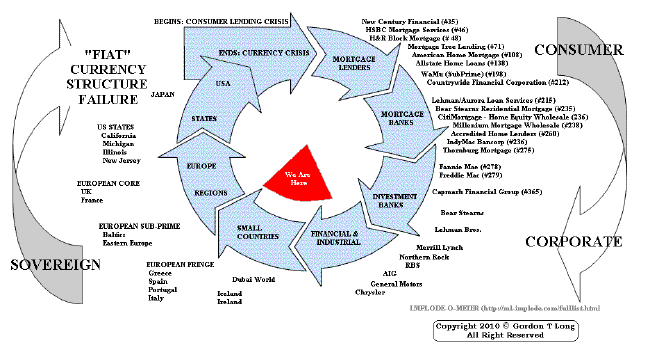
6- THE SHUT-OUT
The
whispering has now ended on stage and only the PATSIES remain. They stand
nervously clutching their newly minted Swap contracts.
This is
the stage where the PATSY is trapped by something unexpected. An
original assumption has changed. A key parameter was found critically
flawed. What was commonly accepted as a �truism� or 'given' is no longer
true or predictable.
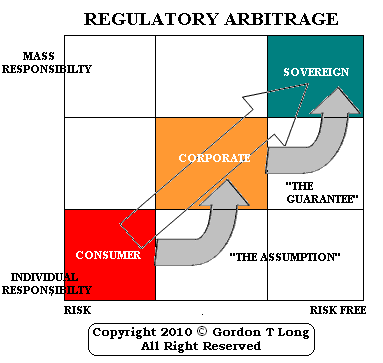 Our
chart above shows that the financial crisis began with Sub-Prime Consumer lending
and eventually took down most of the US mortgage lending industry. It then rolled on to engulf Fannie Mae /
Freddie Mac / AIG and almost ended Investment Banking as we have
known it in America. What may be misunderstood is how the obligations were
all rolled upward. What was consumer debt suddenly became corporate debt
(i.e. Fannie Mae) which then became sovereign debt (i.e. Fannie
Mae / AIG). This is not by coincidence. The 'assumption' of the
obligations and the securing of the �Guarantee� of debt are part of what
we might label as Regulatory Arbitrage.
Our
chart above shows that the financial crisis began with Sub-Prime Consumer lending
and eventually took down most of the US mortgage lending industry. It then rolled on to engulf Fannie Mae /
Freddie Mac / AIG and almost ended Investment Banking as we have
known it in America. What may be misunderstood is how the obligations were
all rolled upward. What was consumer debt suddenly became corporate debt
(i.e. Fannie Mae) which then became sovereign debt (i.e. Fannie
Mae / AIG). This is not by coincidence. The 'assumption' of the
obligations and the securing of the �Guarantee� of debt are part of what
we might label as Regulatory Arbitrage.
Regulatory
Arbitrage strategies were never clearer than during the following periods
when the US Government was forced:
1- To Lend or Guarantee GM and Chrysler
debt, as stock prices were crushed along with their bond prices and CDS
activity shot up. Don�t forget GMAC in these commitments.
2- To pay AIG obligations of
$182.3B
based on contracts that were heresy. The US government felt it had no
choice but to immediately pass legislation to spend $700 Trillion for
TARP (Troubled Asset Relief Program) to bailout
insolvent banks who declared record profits less than 9 months later.
3- To
suddenly accept the obligations of Fannie Mae and Freddie Mac into
Conservatorship. This was after years of the US
government denying it had implicit responsibility for the debt and
obligations of these agencies. This public charade came crashing down in
September 2008.
It is a
chess game between a keen eyed chess champion executing a carefully
choreographed strategy with each move versus a hallucinating crack cocaine
addict.
Strategy
is something that happens to you when you are looking the other way!
Anonymous
CEO during a bankruptcy proceeding
Let�s take
a second and �peel the onion� on just one of many examples, using the
Fannie Mae and Freddie Mac example above as an illustration.
On
Christmas Eve 2009 the Obama administration quietly slipped out an
announcement entitled �Treasury
Issues Update of Support For Housing Programs�.(4)
The Sub-Titles are labeled �Program Wind Downs� and �Amendments to Terms
of Preferred Stock Purchase Agreements�. A person would have to have
nearly no life to start crawling through such a document with these
headings instead of slipping away to do some last minute family shopping.
But there buried near the end of the fourth paragraph, you read: �Treasury
is now amending the PSPAs to allow the cap on Treasury's funding
commitment under these agreements to increase as necessary to
accommodate any cumulative reduction in net worth over the next
three years�.
(bold mine) Also at the end of the next paragraph, you find:
"The amendments to these
agreements announced today should leave no uncertainty about the
Treasury's commitment to support these firms as they continue to play a
vital role in the housing market during this current crisis.�.
Immediately the Washington Post who pays people to work these holidays ran this story
on Christmas Day:
�U.S.
promises unlimited financial assistance to Fannie Mae, Freddie Mac�.
I am sure this pulled everyone away from the Christmas family meal to
read. Bloomberg also hastily ran the story on Christmas Day: �U.S.
Treasury Ends Cap on Fannie, Freddie Lifeline for 3 Years�
which many who have Bloomberg screens in their home office would have
been riveted to. By Monday the coverage was way down the reading list below
breaking news and the stale yesterday's news. I thought Representative
Scott Garrett (R-N.J.), a member of the House Financial Services
subcommittee that oversees Fannie Mae and Freddie Mac, said it well in the
Washington Post on Christmas Day:
"The Obama administration's decision to write a blank check with taxpayer
dollars for the continued bailout of Fannie Mae and Freddie Mac is
appalling. Not only is this a continued bailout of failed entities that
need to be privatized to protect the taxpayer, the timing of the
announcement is clearly designed to try and sneak the bailout by the
taxpayers."
Representative Scott Garrett (R-N.J.)
U.S.
promises unlimited financial assistance to Fannie Mae, Freddie Mac
Washington
Post
This is
used simply as an instructive example of how things work when people are
feeding at the public trough and how Sovereign Guarantees are secured
within the Holy Grail of Lending. What we learned from the housing bubble
is when accountability was removed; deviant behavior was prone to occur.
When the banks stopped holding the mortgages on houses they initially lent
money to, their motivations changed. In this example, the ultimate
accountability rested with the taxpayer who is almost completely unaware.
The taxpayers� elected representatives are not representing. They are
absent or �handcuffed�. I have heard endless politicians like
Representative Scott Garrett express their frustrations. Michael Moore�s
alarming new movie: �Capitalism:
A Love Story�
is worth reviewing simply to listen to our elected officials using phrase
like �Coup d��tat�.
We have
never witnessed more debt so successfully shifted up the Debt Risk Ladder
to Sovereign debt in the history of the MANKIND.
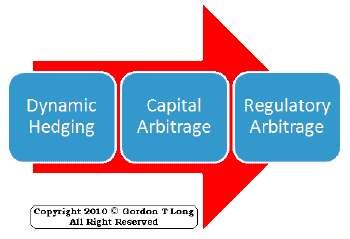
There is
an old saying:
OLD
SAYING:
�When you
owe the bank
$100,000
and can�t pay you have a problem.
When you owe the bank 100M
($100,000,000)
and can�t pay the bank has a problem�.
TODAY�S
VERSION:
When the
banks owe 100B
($100,000,000,000)
and can�t pay the banks have a problem.
When the banks owe 1T
($1,000,000,000,000)
and can�t pay, MANKIND has a problem�.
To say
governments are being trapped is rather an understatement. Ask the furious
electorate what they think. In the US many border on rebellion with �tea
parties�, while the lunatic fringe crashed a plane into a government
building and another shot military personnel at the pentagon. This is new
behavior not seen in the US. The rage was palpable for those that
witnessed firsthand the election of Scott Brown in Massachusetts. Ask the
rioters in the streets of Greece. It is obvious to all but our DIRECTORS
� still in near oblivion to how they are being played like a violin. The
public has the street smarts to spot a sting, even when those in power
claim to not see it - like former Fed Chairman Alan Greenspan not seeing
the US housing bubble. This may all seem like political hyperbole
from yours truly, but it is important to
the success of �The Getaway�, as you will see later in Act III
The vice is squeezing to set up the actual STING.
7- THE
STING
Events
have changed and our PATSIES found that what was a good idea doesn�t appear to
be such a good idea any longer. They begin reading the small print in
their Swap contract to see how they might alter their commitments (see
Sultans of Swap: Fearing the Gearing!).
What we
have witnessed since 2002 is a race by consumer borrowers to capture what
they perceived to be low rates and by consumer lenders (i.e. pensioners on
fixed income) to chase yield. Like addicts needing a fix they both wanted
it now � immediately. In the case of professional borrowers and lenders,
jobs, careers and advancement were on the line. Success was felt to be
determined by getting another 15 points or possibly 100 basis points. All
were clearly short term preoccupations. They were looking the other way!
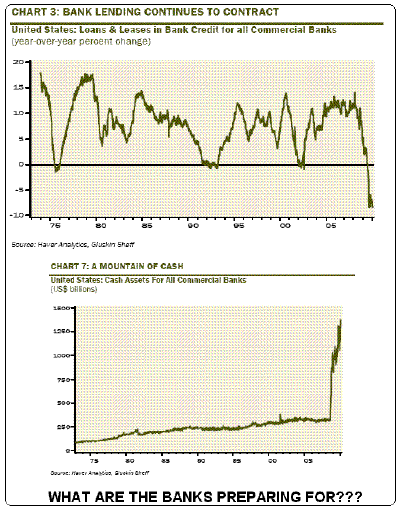 We
have see states and municipalities locking themselves into contracts
unwittingly for 30 years versus 10 years, as pointed out the New York Times
(5). They locked themselves into balloon payments that they cannot
possibly ever pay as we witnessed with Kitlos PLC and the Greek government
debt. Debt will be financed in the future with higher principle
amounts (see the growing list at
SULTANS). In a moment we will discuss the
interest rates these rollovers may potentially command.
We
have see states and municipalities locking themselves into contracts
unwittingly for 30 years versus 10 years, as pointed out the New York Times
(5). They locked themselves into balloon payments that they cannot
possibly ever pay as we witnessed with Kitlos PLC and the Greek government
debt. Debt will be financed in the future with higher principle
amounts (see the growing list at
SULTANS). In a moment we will discuss the
interest rates these rollovers may potentially command.
How for
example will the US ever realistically pay for its $62 Trillion in
unfunded liabilities associated with Medicare / Medicaid and Social
Security? (Niall Ferguson estimates it to be $104T (6)). Add to this
another $20T in fiscal spending imbalances by the end of the decade. Since
we don�t have a clue, is it too hard to imagine that those who eventually
will be orchestrating the lending just might?
Unknowable
you say? That may not be. The BANKSTERS seem to know something, if you study the
chart to the right. What they know might be
debatable. What is not debatable, is that they know something is coming!
�The number of companies globally that were rated B- or lower rose to 523,
or 9.3 percent of the total, at the end of last year as speculative-grade
issuers were downgraded, Standard & Poor�s analysts led by
Diane Vazza
said in a March 5 report. That compares with 8.4 percent in 2008 and 5.8
percent in 2007, S&P said.� (8)
�In December, 260 companies had defaulted year-to-date, the
highest count since its series began in 1981. The trailing 12-month
speculative default rate has continued to climb since the crisis though
S&P has lowered its default rate forecast for 2010, because of the
improvement in capital markets. But the more positive default rate
expectation is being driven by increased forbearance by lenders in a
monetary environment propped up by policy-induced liquidity. The S&P
analysts said in a report: �Without a revival in top-line earnings and
growth, many surviving leveraged issuers originated during 2003-2007 could
face renewed default risk unless they significantly reduce their debt
burdens�. (9)
�At the annual conference for the Loan Syndications and Trading
Association, investors and observers said the market�s focus should be
farther into the future. �2011 will be the exciting year,� said James
Ferguson, chief investment officer at Octagon. Problems could arise again
because much of the debt raised to finance the buy-out boom a few years
ago will begin to mature from 2011. The demand that helped to fuel that
boom, mainly from structured vehicles called collateralized loan
obligations (CLOs), has fallen. The financial market also will not have
the support of government stimulus, which will be winding down by then.
Roughly $1,000bn of leveraged loans and bonds are coming due over the next
five years, according to Michael Zupon of Sound Harbor Partners, while
$500bn of CLOs are coming to the end of their investment periods. New
issuance of CLOs has dried up in the downturn. �It sets the stage for what
could be a dramatic period in 2012, 2013 and 2014,� said Mr Zupon. �If it
comes at the same time as an economic downturn, it could create a pretty
serious situation.� (10)
�Edward Altman, the Max L Heine professor of finance at the Stern School
of Business at New York University, said that the surge in so-called
distressed exchanges over the last two years also could add another layer
of defaults. Companies ranging from casino operator Harrah�s to commercial
lender CIT, have tried, both successfully and not, to convince investors
to exchange existing debt for other securities or cash to avoid
bankruptcy. Such exchanges, which usually only happen a few times a year,
exploded to 14 in 2008 and 39 this year. �Fifty per cent of all distressed
exchanges wind up in bankruptcy one to three years after,� Mr. Altman said.
�Of the 2009 crop of distressed exchanges, half will go bankruptcy in 2011,
2012 and 2013.� Mr. Altman, a noted default forecaster, also warned that
optimistic 2010 default forecasts were vulnerable to a downturn in the
economy. (10)
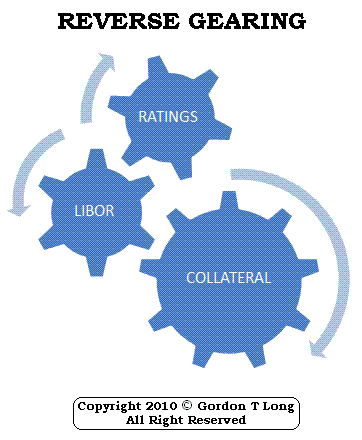
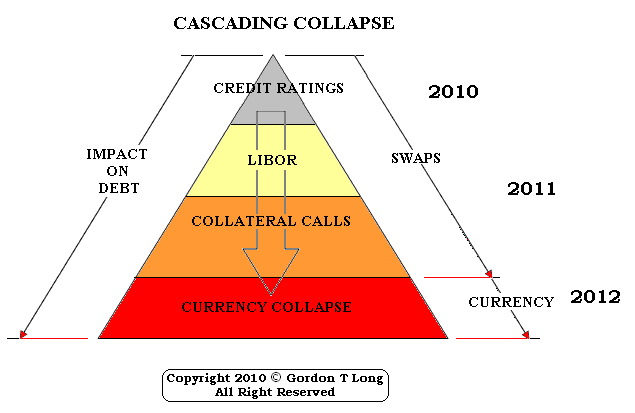
The growth
area in Investment banking is presently bankruptcy, restructuring and
workouts as they gear up for the eventuality. Massive defaults are coming
and everyone knows it except the PATSIES, DIRECTORS and unfortunately the
taxpayer. (see
SULTANS OF SWAP: Fearing the Gearing!)
Ratings will continue to be downgraded which will drive up borrowing
costs and possibly more importantly will drive collateral calls associated
with Interest Rate Swaps.
We mentioned previously that a key part of a sting is that the assumptions
upon which decisions were taken change. We pointed out in �SULTANS
OF SWAP: Smoking Guns!�
that
�the five largest U.S. derivatives dealers,
including
JPMorgan Chase & Co.,
Goldman Sachs Group Inc. and
Bank of America Corp., were on pace through the third quarter to record as much as
$35 billion in revenue last year from trading unregulated derivatives
contracts, according to company reports collected by the Federal Reserve
and people familiar with banks� income sources.� (11)
But it gets worse. In a March 15th, 2010 Business Week
article entitled:
Goldman Sachs Demands Derivatives Collateral It Won�t Dish Out
the �vig�of $35B pales in comparison to �demanding unequal arrangements
with hedge-fund firms, forcing them to post more cash collateral to offset
risks on trades while putting up less on their own wagers. At the end of
December this imbalance furnished Goldman Sachs with $110 billion,
according to a filing. That�s money it can reinvest in higher-yielding
assets. �If you�re seen as a major player and you have a product that
people can�t get elsewhere, you have the negotiating power,� said Richard
Lindsey, a former director of market regulation at the U.S. Securities and
Exchange Commission who ran the prime brokerage unit at Bear Stearns Cos.
from 1999 to 2006. �Goldman and a handful of other banks are the places
where people can get over-the-counter products today.�(12) It isn�t just
new deals, it includes deals that not only corporate but more and more
sovereign PATSIES must restructure.
�Over the last three years the BANKSTERS are extracting ever larger
amounts from the $605 Trillion over-the-counter derivatives market
according to filings with the SEC and reported by Business Week &
Bloomberg. The firm led by Chief Executive Officer Lloyd C. Blankfein
collected cash collateral that represented 57 percent of outstanding
over-the-counter derivatives assets as of December 2009, while it posted
just 16 percent on liabilities, the firm said in a filing this month. That
gap has widened from rates of 45 percent versus 18 percent in 2008 and 32
percent versus 19 percent in 2007, company filings show.
�That�s classic
collateral arbitrage,� said Brad Hintz, an analyst at Sanford C. Bernstein
& Co. in New York who previously worked as treasurer at Morgan Stanley and
chief financial officer at Lehman Brothers Holdings Inc. �You always want
to enter into something where you�re getting more collateral in than what
you�re putting out.�� (12)
THE
COLLATERAL SQUEEZE
|
|
2007 |
2008 |
2009 |
|
GOLDMAN SACHS |
|
|
|
|
COLLECTS |
32% |
45% |
57% |
|
POSTS |
19% |
18% |
16% |
|
NET |
13% |
27% |
41% |
|
|
|
|
110B |
|
|
|
|
|
|
JP MORGAN |
|
|
|
|
COLLECTS |
47% |
47% |
57% |
|
POSTS |
26% |
37% |
45% |
|
NET |
21% |
37% |
45% |
|
|
|
|
37B |
SOURCE:
03-15-10
Goldman Sachs Demands Derivatives Collateral It Won�t Dish
Out Business Week / Bloomberg
�Banks have an advantage in dealing with asset managers because they can
require collateral when initiating a trade, sometimes amounting to as much
as 20 percent of the notional value, said Craig Stein, a partner at law
firm Schulte Roth & Zabel LLP in New York who represents hedge-fund
clients.� (12)
"We
will make them an offer they can't refuse!"
Marlon
Brando on consummating a financial deal in the "Godfather'
All MBA students have studied decision trees and probability paths. Our
PRODUCERS and BANKSTERS with little doubt have the finest army of young
MBA and PhD�s (Quants) graduates in the world working for them. Smart
strategists know that one of the secrets to successful strategy
optimization is in understanding the probability chains. The primary
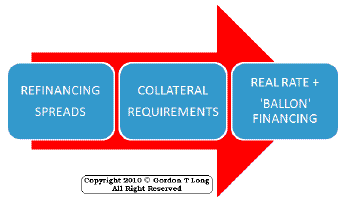 probability
chain presently suggests an unfolding sequence that will start with Credit
Rating downgrades. This pattern as I mentioned above is now underway but
still is not as visible as it soon will be.
probability
chain presently suggests an unfolding sequence that will start with Credit
Rating downgrades. This pattern as I mentioned above is now underway but
still is not as visible as it soon will be.
Interest
Rates
will soon
begin to rise
for many. A global shortage of savings to fund what is simply monumental
levels of debt can lead to no other result. The question is only when?
Smart money doesn�t let the daily noise distract them, which pre-occupies
the amateurs.
The next shoe will be collateral calls. In the financial crisis we had
margin calls on falling equity prices. This time the
probabilities suggest it will be Collateral Calls
because of lowered ratings and increased risk metrics. We outlined this
inherent trigger with Interest Rate Swaps in
Sultans of
Swap � Explaining $605 Trillion in Derivatives
and
Sultans of
Swap: Fearing the Gearing!
The Business Week / Bloomberg article 3/15/10: �Goldman
Sachs Demands Derivatives Collateral It Won�t Dish Out�
gives a clear sense of activity presently going on in this
area.
The most probable outcome by 2012 will be an extremely serious problem
within the global 'fiat' currency markets. It will be centered on 'fiat'
currencies because they are not anchored or based on any specific
standards such as a gold standard. Presently the vast number of currencies
is �fiat�. They are based on 'confidence'. Confidence today is
becoming a commodity in short supply.
Fiat currencies are also open to debasement. Competitive devaluations and
beggar-thy-neighbor policies are highly likely as trade is fiercely
fought over in
PIMCO�s �New Normal�
. The world�s largest Bond Fund has some fairly clear views on this and
you would suspect is acting accordingly � now.
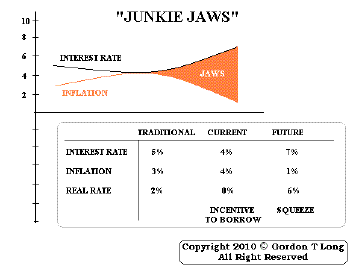 What
will this mean to those with a strategy, who have set-up the pins and have
been patient? It means initially (as we are seeing now) huge OTC Spreads
by panicky PATSIES forced to get out or renegotiate contracts. It will
soon mean years of built-in balloon payments come due just as
interest rates are rising and the PATSIES have even lower credit ratings than
they had when they assumed the underlying contracts.
What
will this mean to those with a strategy, who have set-up the pins and have
been patient? It means initially (as we are seeing now) huge OTC Spreads
by panicky PATSIES forced to get out or renegotiate contracts. It will
soon mean years of built-in balloon payments come due just as
interest rates are rising and the PATSIES have even lower credit ratings than
they had when they assumed the underlying contracts.
The real crunch potentially comes when interest rates are rising but
inflation is falling, as we have heightened concerns with a deflationary
depression. However, we don�t need this to occur to have low inflation
rates. This will potentially crush our debt junkies in their jaws.
Only a minor move could leave PRODUCERS and BANKSTERS
with a �take� of dramatic proportions as illustrated to the right.
The never ending argument of whether we are going to see Inflation or
Deflation never ceases to amaze me. No one ever asks the question, when?
This is important because the element of time allows for the possibility
of both. A probability path could entail a brief period of stagflation
with slow growth and increasing rates; then as the government continues to
print more money, velocity of money finally kicks in and we have a near
�Minsky Melt-up�. This short lived period of Inflation just as quickly
ends in a currency crisis and subsequent global deflation.
This
probability path produces profits on a $605T derivatives market
that would restructure the global balances of economic and financial
power.
All the
models of the probability paths lead to profits of varying degrees for
key members of the Sultans of Swap. Unlike the PATSIES or taxpayers, the
SULTANS HAVE A STRATEGY. The probability paths suggest an ugly future for
the PATSIES and those that either work for them or are the taxpayers,
responsible for the commitments our elected officials have guaranteed. It
is hard to win against someone who has a strategy and you are unaware of
the game, the rules, the goals and even worse, don�t even know a game is being
played.
The above is not how the process will likely unfold. That is precisely why
you have a strategy � to know what to alter to meet your goals. You need
to be organized to do this. If there is one thing the Sultans have
demonstrated in developing a $605 Trillion derivatives market as fast as
they have, it is that they are organized.
INTERMISSION
We will return shortly with Act III
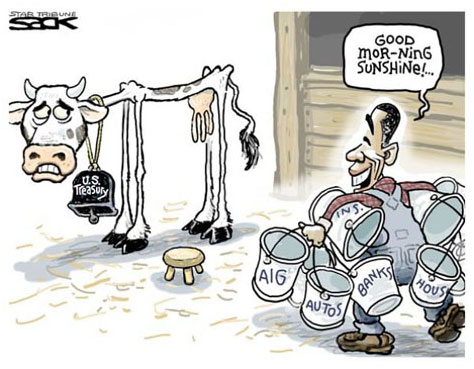
Sign Up for the next release in the Sultans of Swap
series:
Sultans
ACT III � THE GET AWAY
The
third act is the unraveling of the plot. The characters involved in the
heist will be turned against one another or one of the characters will
have made arrangements with some outside party, who will interfere.
Normally, most of or all the characters involved in the heist will end
up dead, captured by the law, or without any of the loot; however, it is
becoming increasingly common for the conspirators to be successful,
particularly if the target is portrayed as being of low moral standing,
such as
casinos,
corrupt
organisations or individuals, or fellow criminals.
SOURCES
(1) 03-09-10
Keynote Address of Chairman Gary Gensler, OTC Derivatives Reform,,
Markit�s Outlook for OTC Derivatives Markets Conference
(2) 03-11-10
Remarks of Chairman Gary Gensler, OTC Derivatives Reform
, FIA's Annual International Futures Industry Conference
(3)
�The Warning� PBS FRONTLINE - Video
(4) 12-24-09
TREASURY ISSUES UPDATE ON STATUS OF SUPPORT FOR HOUSING
PROGRAMS
(5) 03-05-10
The Swaps that Swallowed Your Town
the New York Times
(6) 12-14-09
An Empire at Risk
Newsweek Magazine
(7)
CSPAN
- Rep Paul Kanjorski Reviews the Bailout Situation
(8) 03-05-10
Nearly 10% Of Global
Corporate Issuers Were Rated 'B-' Or Lower At The End Of 2009
Standard & Poors
(9) 12-22-09
S&P�s �weakest links� list
falls sharply Financial Times
(10) 10-29-09
Warning on 2011 corporate
default risk Financial Times
(11) 03-01-10
Frank, Peterson Vow to Eliminate Provision Keeping Swaps
Opaque
Bloomberg
(12) 03-15-10
Goldman Sachs Demands
Derivatives Collateral It Won�t Dish Out Business Week
/ Bloomberg
FREE
Additional Research Reports at Web Site:
Tipping Points
Gordon T Long
Tipping
Points
Mr. Long
is a former senior group executive with IBM & Motorola, a principle in a
high tech public start-up and founder of a private venture capital fund.
He is presently involved in private equity placements internationally
along with proprietary trading involving the development & application of
Chaos Theory and Mandelbrot Generator algorithms.
Gordon T Long is not a registered advisor and does not give investment
advice. His comments are an expression of opinion only and should not be
construed in any manner whatsoever as recommendations to buy or sell a
stock, option, future, bond, commodity or any other financial instrument
at any time. While he believes his statements to be true, they always
depend on the reliability of his own credible sources. Of course, he
recommends that you consult with a qualified investment advisor, one
licensed by appropriate regulatory agencies in your legal jurisdiction,
before making any investment decisions, and barring that, we encourage you
confirm the facts on your own before making important investment
commitments.
� Copyright 2010 Gordon T Long. The information herein was obtained from
sources which Mr. Long believes reliable, but he does not guarantee its
accuracy. None of the information, advertisements, website links, or any
opinions expressed constitutes a solicitation of the purchase or sale of
any securities or commodities. Please note that Mr. Long may already have
invested or may from time to time invest in securities that are
recommended or otherwise covered on this website. Mr. Long does not intend
to disclose the extent of any current holdings or future transactions with
respect to any particular security. You should consider this possibility
before investing in any security based upon statements and information
contained in any report, post, comment or recommendation you receive from
him.




